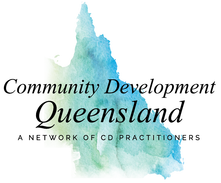Guiding principles
|
Community development is about moving from private concern to public action. It is a relationship-based method underpinned by guiding principles. See this 10 minute video of Peter Westoby "Exploring Community Development".
A tradition of community development has evolved in Queensland since the 1970s with many practitioners trained and/or mentored by people including Les Halliwell, Anthony Kelly, Sandra Sewell, Carmel Daveson, Bea Rogan, Dave Andrews and many others. Elements of this method of community development practice are about moving from a private concern to public action. It is a relationship-based method underpinned by guiding principles (see Lynda Shevaller's 2015 Les Halliwell address). The following principles guide those who share this approach to social and individual change work. These are intrinsically linked to social justice principles including – equity, equality, participation and access:
|
Informed
|
In Bea Rogan’s Community Development Training Booklet (2002) it states:
Community development is about the building of active, informed communities where people
|
|
Values |
As community development practitioners we are influenced by the values that we, as individuals, hold. There is often a great deal of debate about values and principles and what they mean.
We all need to reflect on our core values and then draw principles from our values, as a principle is a pathway to action. Community development practitioners have the capacity to influence individuals, organisations, sectors and systems. The principles which underpin our work will shape the direction of that influence.
|



